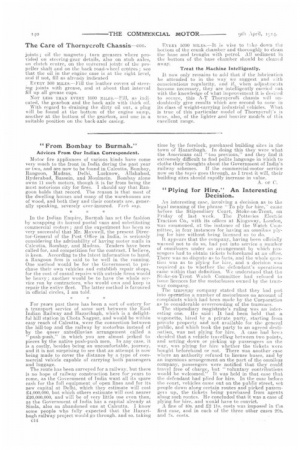"From Bombay to Burmah."
Page 16

If you've noticed an error in this article please click here to report it so we can fix it.
Advices From Our Indian Correspondent.
Motetfire appliances of various kinds have come very much to the front in India during the past year or two, and are now to be found in Calcutta, Bombay, Rangoon, Madras, Delhi, Lucknow, Allahabad, Hyderabad, Bassein, and Moulmein. Bombay alone owns 11 such motors, though it is far from being the most notorious city for fires. I should say that Rangoon holds that record. The reason is that most of the dwelling houses and many of the warehouses are of wood, and both they and their contents are, generally speaking, severely over-insured. Vera sap.
In the Indian Empire, Burmah has set. the fashion by scrapping its horsed postal vans and substituting commercial motors ; and the experiment leas been so very successful that. Mr. Maxwell, the present Director-General of the Post Office in India. is seriously considering the advisability of having motor mails in Calcutta. Bombay, and Madras. Tenders have been called for, and competition for the contract, I believe, is keen. According to the latest information to hand, a Rangoon firm is said to be well in the running. One method would be for the Government to purchase their own vehicles and establish repair shops, for the cost of casual repairs with outside firms would be heavy ; another would be to have the whole service run by contractors, who would own and keep in repair the entise fleet. The latter method is favoured in official circles, I am told.
For years past there has been a sort of outcry for a transport service of some sort between the East Indian Railway and Hazaribagh, which is a delightful hill station in Chota Nagpur, and would be within easy reach of Calcutta, were the connection between the hill-top and the railway by motorbus instead of by the queer antediluvian arrangement called a " push-push," in which you are almost jerked to pieces by the native push-push men. In any case, it is a costly, besides being an uncomfortable, journey, and it is not surprising to see that an attempt is now being made to cover the distance by a type of commercial vehicle capable of carrying both passengers and luggage.
The route has been surveyed for a railway, but there is no hope of railway construction here for years to come, as the Government of India want all its spare cash for the full equipment of open lines and for its new capital at Delhi, which they estimate will cost 14,000,000, but which others estimate will cost nearer 120,000,000, and will be of very little use even then, as the Government of India has a capital already at Simla, also an abandoned one at Calcutta. I know some people who fully expected that the Ilazaribagh railway project would go through, and so, taking c14 time by the forelock, purchased building sites in the town of Hazaribagh. In doing this they were what the Americans call "too previous," and they find it extremely difficult to find polite language in which to clothe their thoughts about the Government of India's
railway schemes. If the commercial-motor service now on the tapis goes through, as I trust it will, their building sites should rapidly increase in value.
A. or C.
"Plying for Hire." An Interesting Decision.
An interesting case, involving a decision as to the legal meaning of the phrase "To ply for hire," came before the Stipendiary Court, Stoke-on-Trent, on Friday of last week. The Potteries Electsie Traction Co., with its offices at Kingswa.y, London, was summoned, at the instance of the Watch Committee, in four instances for having an omnibies plying for hire without being licensed so to do.
It appears that the company, having been officially warned not to do so, had out into service a number of omnibuses under an arrangement by which passengers had to obtain tickets beforehand at an oface. There was no dispute as to facts, and the whole question was as to plyiag for hire, and a decision was required as to whether the defendant's operations came within that definition. We understand that the Stoke-on-Trent Watch Committee had refused to issue licences for the motorbuses owned by the tramway company.
The tramway company stated that they had put into operation a number of motorbuses on account of complaints which had been made by the Corporation as to considerable overcrowding of the tramcars. The stipendiary magistrate's ruling was an interesting one. He said : It had been held that a wagonette, hired by a private party, starting front private property and not available fol the general public, and which took the party to an agreed destinatiam, was not plying for hire. A case. had beea decided that a vehicle travelling between two points, and setting clown or picking up passengers on the way, was plying for hire whether the tickets were bought beforehand or not. Therewas another ease where an authority refused to license buses, and by an ingenious arrangement on the part of the omnibus company, passengers were notified that they could travel free of charge, but "voluntary contributions would be welcomed." It was held in that ease that. the defendant had plied for hire. In the ease before the court, vehicles came out on the public street, set people down along certain routes and picked passengers up, the tickets being purchased from agents along such routes. He concluded that it was a case of plying for hire, and would have to convict.
A fine of aas. and £2 rts, costs was imposed in the first case, and in each of the three other cases 20s. and 7s. costs.
























